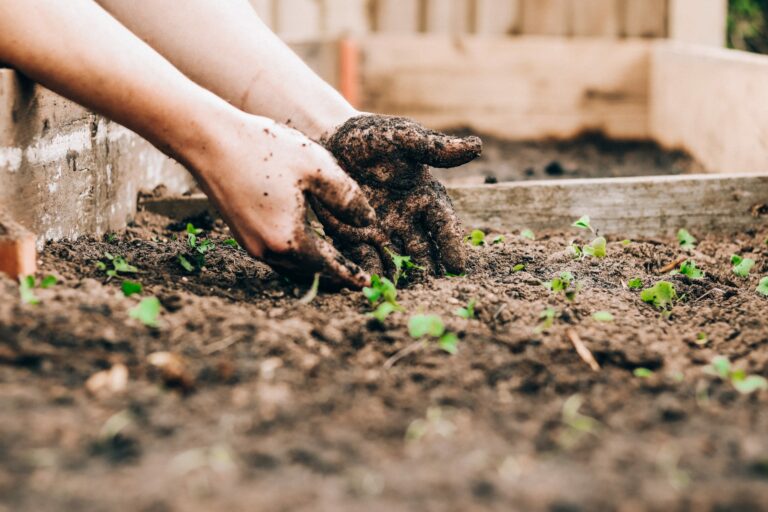During National Gardening Week (2nd-8th May) and Mental Health Awareness Week (9th-15th May), we want to raise awareness about the benefits of gardening on mental health for our clients, and our supporters too.
There is something we all have in common: as well as our physical health, good mental health is of paramount importance for improving our quality of life.
Our mental health influences the way we feel, think, act and behave so taking care of it and treating any mental health issues with the right support is crucial to improve our wellbeing.
Anyone can struggle with a mental health problem at any point in their lives.
According to recent studies, 1 in 4 people will experience a mental health problem of some kind each year in England [1].
1 in 6 people report experiencing a common mental health problem (like anxiety and depression) in any given week in England [2].
But we know that some groups are more at risk than others, in fact, evidence shows a strong link between mental health issues and homelessness. This is because homelessness is often linked to several risk factors, including:
- facing social inequality and disadvantage;
- facing discrimination and social exclusion;
- going through traumatic experiences;
- differences in physical health.
Homeless people often have difficulty accessing healthcare services because they don’t have a permanent home or address. These barriers contribute to excluding them from being part of society and making their journey a lot harder, both physically and mentally. Being homeless is unhealthy in itself – the life expectancy of a rough sleeper is significantly lower than the national average. This is why we find supporting our clients of vital importance.
In recent years, there has been increasing acknowledgement of the important role mental health plays in achieving development goals. And gardening can be a wonderful activity to help reduce stress and practice mindfulness.
The benefits of gardening:
- Gardening can reduce stress
In 2013 an article in the Mental Health Journal cited gardening as being able to reduce depression, anxiety and stress-related symptoms. [3] Our clients often report a range of feelings including fear, insecurity, alienation, confusion, loss of self-esteem and anger. The experience of homelessness can be quite traumatic for some. Therefore, mindful activities like gardening can have a hugely positive impact on our clients’ health, helping them relieve stress and improving their outlook on a outdoor activity.
- Gardening is a mood booster
Gardening can be fun and creative. It can be a therapeutic activity, capable of improving mood and reducing reliance on medication, and self-harming behaviour. [3] This supports our efforts to help our clients overcome these issues when they come to us.
- Gardening can help build self-esteem
While gardens can be relaxing, they can also be places where our efforts result in a real sense of achievement, boosting confidence and self-esteem. It feels good to see the results of your hard work and observe the seeds you planted grow into something new to be nurtured and cherished. Building hope and developing a positive outlook on the future can be incredibly meaningful for homeless individuals trying to regain housing.
- Gardening can improve focus skills
This activity can increase the ability to concentrate, engage, and complete tasks. These are such versatile soft skills that can be applied in our private or work life and are proved to be very useful.
“The glory of gardening: hands in the dirt, head in the sun, heart with nature. To nurture a garden is to feed not just on the body, but the soul.”-Alfred Austin
We hope to encourage more of our clients (and supporters!) to take part in this healthy and productive outdoor activity, especially as we head into the summer.
Our HOX Gardening Club based in Bicester is looking for a keen gardener to help and advise our clients to create a vegetable garden. We are hoping to find a volunteer that can come every other Tuesday from 12-2 PM to help them create a vegetable patch that will hopefully provide them with food a little later in the year. If you have time to give and are experienced in growing vegetables please get in touch. A DBS will be required as this is a client-facing role
Please have a look at our services and projects to support the homeless in Oxfordshire.
You can help us fund our services with a donation. https://homelessoxfordshire.uk/support-us/donate/
Or if you would like to help in other ways, we always welcome volunteers. Please visit our page for details: https://homelessoxfordshire.uk/support-us/volunteer/
References
- McManus, S., Meltzer, H., Brugha, T. S., Bebbington, P. E., & Jenkins, R. (2009). Adult psychiatric morbidity in England, 2007: results of a household survey.
- McManus S, Bebbington P, Jenkins R, Brugha T. (eds.) (2016). Mental health and wellbeing in England: Adult psychiatric morbidity survey 2014.
- Mental Health Review Journal (2013). A review of gardening-based interventions for people experiencing mental health difficulties reported that benefits include a reduction in symptoms of depression and anxiety and an increase in attentional capacity and self-esteem. Key benefits include emotional benefits such as reduced stress and improved mood.
Help us to end homelessness not just manage it
Please make a one-off or regular donation today











